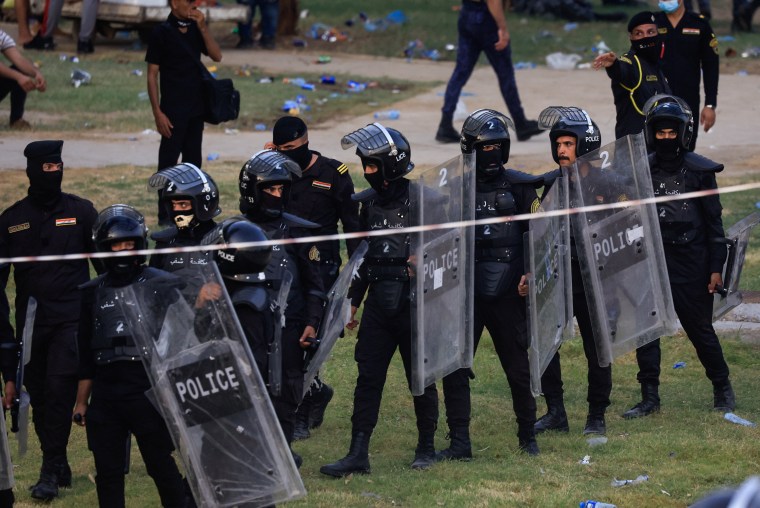Beirut, August 2, 2022 — Iraqi authorities should allow journalists to cover protests freely and safely, and should ensure that security forces do not attack members of the press, the Committee to Protect Journalists said Tuesday.
On Saturday, July 30, three journalists with the privately owned Al-Mayadeen news broadcaster were injured while they covered protests in Baghdad’s Green Zone by supporters of Iraqi Shiite cleric Muqtada al-Sadr, according to news reports and the journalists, who spoke to CPJ over the phone.
Security forces fired flash-bang grenades that hit Al-Mayadeen videographer Zaid Khaled Jomaa and reporter and Baghdad bureau chief Abdullah Badran; separately, riot police officers shoved videographer Abdullah Saad to the ground, injuring his ankle and leg, the journalists said.
“Iraqi authorities must protect journalists covering protests in Baghdad and allow them to report on the political situation in the country freely and safely,” said CPJ’s Middle East and North Africa senior researcher, Justin Shilad, in New York. “Iraqi journalists have been doing essential work in adverse circumstances for years informing the public, and authorities must allow them to continue that work without fear.”
Sadr supporters occupied the parliament building on July 27 and on July 30, and on Monday announced plans for wider protests throughout Iraq, according to news reports.
On Saturday, the Al-Mayadeen team was covering protesters’ attempt to enter parliament when security forces fired flash-bang grenades in an attempt to disperse the demonstrations; one of those grenades hit Badran in the back, and another hit Jomaa in his left leg, according to the journalists and video of the incident.
Saad told CPJ that he went to help his colleagues, but riot police officers blocked him and pushed him to the ground.
Badran and Jomaa told CPJ that they sustained bruising from being hit by the grenades, and noted that the projectiles had ricocheted off a concrete wall, which reduced their impact. Saad sprained his ankle and tore a ligament in his leg when he was pushed to the ground, according to the journalist a tweet by one of his colleagues.
All three journalists were taken to the Al-Karama hospital in Baghdad after the incident, they said. Saad told CPJ that doctors ordered him to rest for two weeks, which has prevented him from working.
Badran told CPJ that the team was clearly identifiable as press; in that video, he is seen holding a microphone when he is hit with the grenade. He added that he and Jomaa took cover when the police began firing tear gas, flash-bang grenades, and used water hoses against protesters, “but the officers were shooting from a very close range that we couldn’t escape being hit.”
The three journalists told CPJ they often faced such risks while reporting, and said that Iraqi security forces often failed to distinguish journalists from protesters.
CPJ emailed the Iraqi Ministry of Interior for comment, but did not receive any reply.
